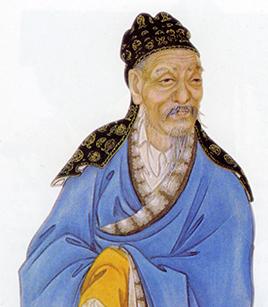Qu Yuan
Author : REN GUANHONG Source : Chinese Social Sciences Today 2021-08-31

An ancient portrait of Qu Yuan Photo: CFP
Qu Yuan (c. 339–278 BCE) was a distinguished statesman and one of the greatest poets in China’s history. He was born in the state of Chu, which was originally one of the duke states under the Western Zhou Dynasty (c. 1046–771 BCE). It rose to prominence in the mid-8th century BCE in the fertile valley of the Yangtze River, and was finally eliminated by the Qin in 223 BCE.
Qu Yuan lived in an era characterized by many rival states battling viciously for territorial advantage and dominance. Astute and eloquent, Qu Yuan advocated an alliance with the Qi state in resistance to the aggression of Qin and helped King Huai of Chu in the reforms for strengthening Chu. As a result, Chu became a mighty force in the alliance against Qin. However, Qu Yuan’s talent caused his rival courtiers to intrigue against him. Estranged from the throne through the malice of his rivals, Qu Yuan was sent into exile several times. In 278 BCE, upon hearing that the capital of Chu was captured by the Qin army, Qu Yuan drowned himself in the Miluo River [a tributary of the Yangtze].
Though in despair over his banishment, Qu Yuan observed various folk rites and legends that greatly influenced his works, including his most famous one, the long melancholic poem “Li Sao” (“On Encountering Sorrow”). “Li Sao” begins with the introduction of the narrator [Qu Yuan manifested himself in the person of this narrator] who is unappreciated and goes unused in a corrupt world, and then proceeds to recount his fantastical physical and spiritual travels in distant regions and the realms of heaven. This poem opens up a new horizon for the development of Chinese literature by initiating a tradition of romanticism.
Qu Yuan subtly merged his pursuit of ideals with artistic imagination and mystical concepts. He used the “beauty” and the “fragrant herbs” to symbolize good government and people of moral integrity, and the filthy and smelly the crafty and evil, thus making a sharp contrast between the true, good, and beautiful, and the shambolic, evil, and hideous. This succinct style helped to produce an immense artistic impact.
Ye Shengtao made Chinese fairy tales from a wilderness
Ye Shengtao (1894–1988) created the first collection of fairy tales in the history of Chinese children’s literature...
-
How northern ethnicities integrated into Chinese nation
2023-09-18
-
Mogao caves
2023-09-12
-
Mogao Grottoes as ‘a place of pilgrimage’
2023-09-12
-
Time-honored architectural traditions in China
2023-08-29
-
Disentangling the civilizational evolution of China
2023-08-28
-
AI ethics in science fiction
2023-08-23














 2011-2013 by www.cssn.cn. All Rights Reserved
2011-2013 by www.cssn.cn. All Rights Reserved